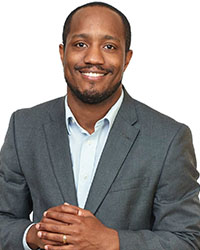Colin Seale '12

What do you enjoy in your off-hours?
My children are 4 and 7 years old. Because I spend so much time traveling across the country in my work to help educators close the critical thinking gap in our schools, my off-hours are mostly “on.” Between being a showstopper in my family’s epic rap battles, jam sessions, and dance-offs and playing the role of Chef Colin, my free time is more like stress-free, family time.
What would be the title of your autobiography?
The Autobiography of a Recovering Underachiever. This is actually the first chapter of my first book, Thinking Like a Lawyer: A Framework for Teaching Critical Thinking to All Students. Throughout K-12 education, college, and grad school, I’d always been rather proud to skate by doing the bare minimum. Law school was transformational because instead of rote memorization, I was challenged to analyze different perspectives, and creatively put together arguments - the same exact tools I used throughout my life growing up in Brooklyn, NY in an under-resourced community. The “Because, not Despite” aspect to reversing my history as an underachiever is something I hope can empower others who struggle with fulfilling their promise.
Do you have a motto and what is it?
Futurist Alvin Toffler said, “The illiterate of the 21st century will not be those who cannot read or write. It will be those who cannot learn, unlearn, and relearn.” With this global pandemic showing us that critical thinking matters more than ever, it is so crucial that we stop worrying about teaching people what to think and start helping them understand how to think.
Tell us about a turning point in your career.
A couple of years into my Associate role at Greenberg Traurig, where I started after graduating from Boyd’s part-time evening program while teaching during the day, I had an epiphany. My office in the Howard Hughes Center had an amazing view of the Las Vegas Strip. One day I looked at the view, then I looked a little closer. At a school near Swenson & Twain, I saw families walking their kids back from school. Then I read about hundreds of long term substitute teachers in our school district, mostly teaching in low-income neighborhoods like this one. This was when I realized that fighting for equity in education is always going to be a closer issue to me, and that’s when I got more involved in local education issues, leading me to eventually launch thinkLaw.
What is your elevator pitch for a recent Boyd Law graduate?
Often, new attorneys believe you can only do “good” work if you become a career public interest attorney. Not so. Recognize that you can be a leader for change in your community no matter where you practice. You don’t have to be a public interest attorney to have an interest in serving the public.